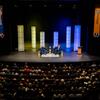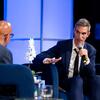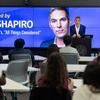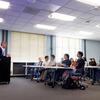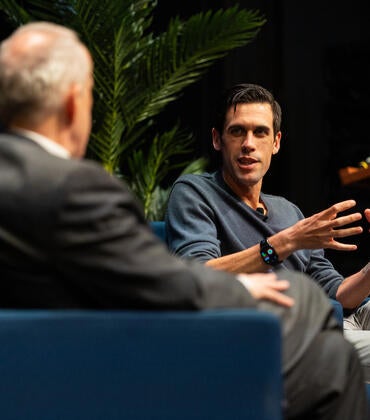At a time when many Americans may be overwhelmed by the constant deluge of news, broadcaster Ari Shapiro described how “radical empathy” can inspire people to remain engaged and hopeful.
The host of NPR’s “All Things Considered,” Shapiro delivered the 56th Annual Hays Press-Enterprise Lecture to a full house at UC Riverside’s University Theatre on Monday, April 21.
The award-winning journalist, who has covered politics, wars, and social issues all over the world, said he keeps a copy of National Public Radio’s 1971 mission statement taped to the side of his office bookshelf where he can see it every day. It states that it will seek to “encourage a sense of active, constructive participation rather than apathetic helplessness.”
That mission remains important at a time when many feel that “gravitational pull of apathetic helplessness,” Shapiro said.
“The central tension in our time is not between order and chaos or good and bad,” he said. “The central tension is between participation and apathy.”
At the start of his speech, Shapiro cited the late Howard H. (Tim) Hays, the former editor and owner of The Press-Enterprise, as exemplifying constructive participation. Hays advocated on behalf of establishing a University of California campus in Riverside and as publisher brought two important First Amendment cases to the Supreme Court, winning the newspaper the Pulitzer Prize.
Shapiro regularly interviews heads of state, CEOs, and celebrities as host of “All Things Considered.” But the interviews that he finds most rewarding and help him cultivate that sense of active participation are with individuals not thought of as powerful but making a difference in their own small way, he said.
They include a young Samoan woman who wore bright dresses and a flower in her hair to joyfully advocate on behalf of her nation at a United Nations climate summit in Glasgow in 2021; an activist who returned to her native Zimbabwe in 2018 after years of exile to call for democracy; and a café owner in Izmir, Turkey, who provided Syrian refugees with a table full of power strips to charge their phones and access to a Wi-Fi code so they could call their loved ones.
When Shapiro asked the café owner why he helped the refugees he replied that he hoped that if he were in their shoes someone would do the same for him.
“’If I put myself in their shoes’ is such a cliché, simple, and, yet, revolutionary phrase,” Shapiro said. “It is an act of radical empathy to attempt to see the world through the eyes of someone else.”
Shapiro said he often gets asked how he remains optimistic in the face of world events or even more simply “Are we going to be ok?” It’s the wrong question, he said, implying a finish line that doesn’t exist and ignoring the idea that someone has to put the pieces back together.
“No matter where we live, no matter what we do, no matter who we are, there is someone in a state of apocalypse,” Shapiro said. “There will always be someone who we are in a position to help, whether we have the power and money of Tim Hays or just own a small sidewalk cafe in Izmir, Turkey.”
Following his talk, Shapiro took questions from creative writing professor Alex Espinoza on a wide variety of topics from the future of NPR’s funding to his forays into singing with the band Pink Martini.
During his campus visit, Shapiro also met with students earlier in the day and answered their questions on topics in the news.
The Hays Press-Enterprise Lecture Series was established in 1966 by Howard H. “Tim” Hays Jr., in collaboration with UC Riverside. His son, Tom Hays, created an endowment fund to ensure the lecture’s tradition lived on after his father’s death in 2011.
The lecture series seeks to present notable journalists to address important topics. In recent years, presenters have included New York Times journalist Michael Barbaro, broadcast journalist Soledad O’Brien, and then-Los Angeles Times executive editor Kevin Merida.


